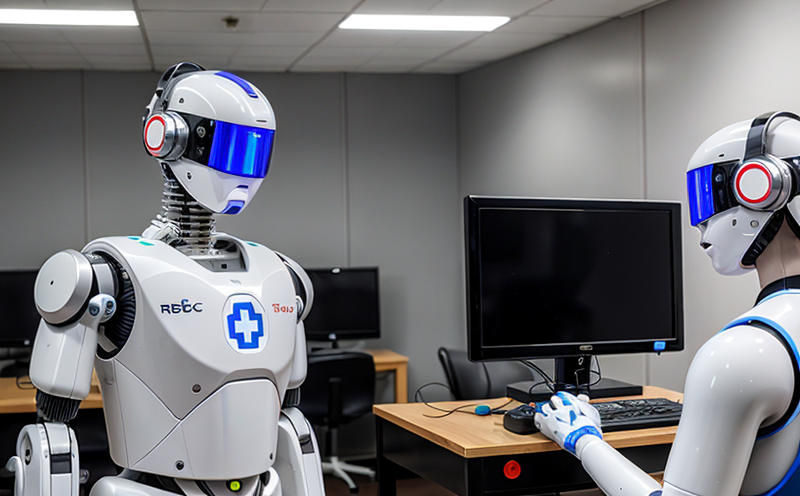ANSI RIA R15.06 Safety Validation for Service Robots
The ANSI/RIA R15.06 standard is a cornerstone in ensuring that service robots are designed, manufactured, and deployed safely within industrial settings. This standard addresses the unique safety challenges posed by robotic systems operating alongside humans or in close proximity to them.
Service robots encompass a wide range of applications such as healthcare assistants, cleaning machines, and delivery drones. These robots interact with people and their environment, making compliance with R15.06 critical for both operational efficiency and regulatory adherence. The standard covers various aspects including risk assessment, safety analysis, and the design process to ensure that any potential hazards are identified and mitigated.
The testing procedures outlined in ANSI/RIA R15.06 are designed to validate that a service robot meets stringent safety requirements before it is deployed in real-world applications. This includes evaluating the robot's ability to safely interact with humans, avoid collisions, and handle unexpected situations. The standard also mandates rigorous testing for mechanical integrity, electrical safety, and software reliability.
Testing under this standard typically involves a series of simulated scenarios that replicate the operational environment where the service robot will be used. This ensures that any potential hazards are identified in a controlled setting before deployment. Compliance with ANSI/RIA R15.06 can significantly reduce liability risks for manufacturers and operators by demonstrating due diligence in safety practices.
Our team at Eurolab specializes in providing comprehensive testing services to ensure compliance with ANSI/RIA R15.06. We offer a full suite of testing capabilities, including but not limited to mechanical stress tests, electrical safety checks, software validation, and system integration evaluations. Our experienced engineers use state-of-the-art equipment and methodologies to conduct thorough assessments that meet the highest industry standards.
By adhering to ANSI/RIA R15.06, manufacturers can ensure their service robots are not only safe but also reliable and efficient in their intended applications. This compliance is essential for gaining market acceptance and ensuring regulatory compliance globally. Our team at Eurolab works closely with clients to understand their specific needs and deliver tailored testing solutions that align with the latest standards.
Our commitment to quality and safety extends beyond mere compliance; we aim to provide insights and recommendations that can enhance the design and performance of service robots. By leveraging our expertise in robotics and artificial intelligence, we offer a holistic approach to ensuring the safe integration of these advanced technologies into everyday life.
- Evaluation of mechanical integrity
- Testing for electrical safety
- Validation of software reliability
- Simulation of operational scenarios
Through rigorous testing and validation, we help our clients achieve compliance with ANSI/RIA R15.06, ensuring that their service robots are safe and reliable in their intended applications.
Applied Standards
The ANSI/RIA R15.06 standard is part of a broader framework for robotics safety standards developed by the Robotic Industries Association (RIA). This standard focuses specifically on service robots, which are defined as autonomous or semi-autonomous devices designed to perform tasks in support of human activities without being integrated into a manufacturing process.
The testing procedures outlined in ANSI/RIA R15.06 are closely aligned with other international standards such as ISO 9241 for ergonomics and ISO 13482 for medical robotics. These standards provide a comprehensive approach to ensuring the safety of service robots, covering everything from mechanical design to software functionality.
The standard is regularly updated to reflect advancements in technology and changes in industry practices. This ensures that manufacturers and operators have access to the latest guidelines for designing and deploying safe service robots. By adhering to these standards, organizations can demonstrate their commitment to safety and regulatory compliance.
Our team at Eurolab stays up-to-date with all relevant standards and regulations to ensure our testing services are always aligned with the latest requirements. We work closely with clients to identify which specific standards apply to their projects and develop tailored testing strategies that meet these demands.
Eurolab Advantages
At Eurolab, we pride ourselves on delivering top-tier testing services for ANSI/RIA R15.06 compliance. Our team of experienced engineers and technicians is dedicated to providing accurate, reliable, and timely results that meet the highest industry standards.
- Expertise in Robotics: Our staff has extensive experience working with robotic systems across various industries, including healthcare, manufacturing, and logistics.
- State-of-the-Art Equipment: We utilize cutting-edge testing equipment to conduct comprehensive evaluations of service robots. This ensures that our results are accurate and repeatable.
- Comprehensive Testing Capabilities: From mechanical stress tests to software validation, we offer a full suite of services to ensure compliance with ANSI/RIA R15.06.
- Client-Centric Approach: We work closely with our clients to understand their specific needs and deliver tailored testing solutions that meet the latest standards.
We are committed to helping our clients achieve compliance with ANSI/RIA R15.06, ensuring their service robots are safe, reliable, and efficient in their intended applications. Our expertise and commitment to quality have earned us a reputation as a leader in robotics testing services.
Environmental and Sustainability Contributions
The ANSI/RIA R15.06 standard plays a crucial role in promoting sustainability by ensuring that service robots are designed with safety in mind. This, in turn, helps reduce the environmental impact of these systems. By minimizing the risk of accidents or malfunctions, service robots can operate more efficiently and effectively.
- Energy Efficiency: Safer and more reliable robots can be programmed to perform tasks more efficiently, reducing energy consumption and waste.
- Extended Lifespan: Proper safety validation helps extend the lifespan of robotic systems, minimizing the need for frequent replacements and disposal.
- Reduced Accidents: By ensuring that robots are safe in all operational scenarios, the risk of accidents is minimized, leading to fewer injuries or property damage.
Our commitment to sustainability extends beyond compliance with ANSI/RIA R15.06; we also work closely with clients to identify opportunities for further reducing their environmental footprint through innovative testing and design strategies.





